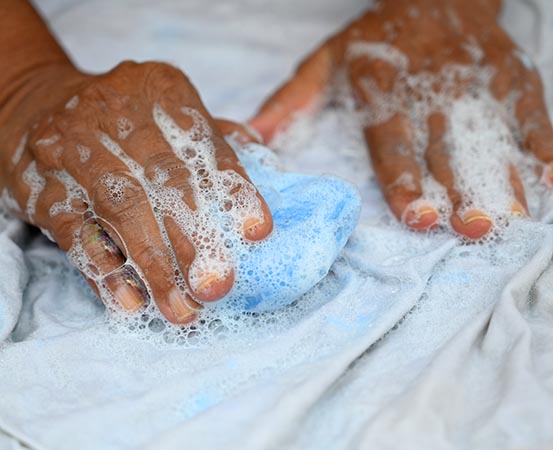
Since her early twenties, Reshma Vivek had to endure peeling skin and red, itchy palms while washing clothes with bar soap. Now 32, Reshma recalls that she realized she had a detergent allergy after repeated episodes of the same. While she avoids using detergents most of the time, when inevitable, she resorts to using gloves to prevent direct exposure. “It was not just itching. With repeated detergent usage, I even faced bleeding palms and fingertips,” says Reshma, who now takes precautions to avoid an allergic reaction.
Laundry and dishwashing detergents (both soap and powder) contain certain chemicals or surfactants that can cause allergic reactions in some. However, it’s not just detergents. The brightening and bleaching agents, along with the chemicals to induce fragrances, can also induce an allergy.
Symptoms of detergent allergy
Detergents can induce skin rashes and itchiness in some, and repeated usage can trigger an allergic reaction.
Dr Simantini Sakherdande, consultant dermatologist and cosmetologist, Manipal Hospital, Panaji, Goa, says symptoms of detergent allergy also include skin peeling, breaking of skin and fluid-filled boils.
“If not treated immediately, these reactions can lead to the development of painful crusts or blisters,” says Dr Vandana Punjabi, senior consultant, dermatology, Nanavati Max Super Speciality Hospital, Mumbai.
In rare cases, long-term chemical inhalation can affect the lungs, warns Dr Balakrishna GK, senior consultant, internal medicine, BGS Gleneagles Global Hospitals, Bangalore. “Individuals working in detergent factories constantly inhale chemical-induced fumes from the detergent. This can cause tightness in the chest, cough without sputum, constant sneezing, constriction of the airways or bronchoconstriction, breathing difficulty, watery nose and eyes, a burning sensation in the eyes and in severe cases, wheezing and shock,” he explains.
Who’s at risk?
According to experts, the type of skin one has also plays a part. Those with inherently dry skin (like Reshma) are most vulnerable to detergent allergies.
Other triggers include thyroid issues, atopic dermatitis or eczema, high immunoglobulin (IgE) levels and occupational hazards, explains Dr Sakherdande.
Detergent allergy: How it affects the skin
The outer protective layer of the skin, known as the epidermis, is composed of lipids. Those at risk can easily be stripped of this layer. Exposure to detergents can cause certain components or chemicals to break into the skin, causing damage.
The optimal pH value of the skin (face and body) ranges from 4.7 to 5.7. Most detergents have a high pH value that reacts with dry skin, causing itchiness and rashes.

Allergy-prone areas in the body
Detergents usually cause allergic reactions where the skin layers are thin. “Typically, an allergic reaction starts manifesting in the web spaces between the fingers and spreads to the top of the hands,” says Dr Punjabi. “It could also affect the skin folds in the underarms and groin area,” she adds.
Diagnosing detergent allergy
Dr Balakrishna lists two common tests for diagnosing a detergent allergy:
- Skin prick test: In the skin prick test, the skin (back or front part of the arm) of the individual is pricked with a needle that contains a micro-drop of the suspected allergen to examine any allergic reaction in the pricked area.
- Patch test: In this test, a micro-drop of the allergen is spread on a plaster and pasted on the upper back of the individual to check for any reactions over 48 hours.
Preventing detergent allergy
Doctors suggest some skincare tips that can help prevent detergent allergy:
- Apply lipid-rich moisturizers (with ceramides or fatty acids) or coconut oil to restore the skin’s pH levels.
- Avoid washing hands multiple times to prevent the natural oils from being stripped off the skin.
- Use lukewarm or cold water during showers or hand washes to prevent dry skin.
- Use cotton-lined rubber gloves or a spoon to avoid direct contact with detergents.
In addition, chemicals from the detergent can also accumulate in clothes, which can cause symptoms. To prevent the chemical build-up, one can take the following measures:
- Soak the clothes in hot water before applying detergent.
- Use liquid detergents instead of soap bars or powders.
- Rinse the clothes twice.
Takeaways
- Laundry and dishwashing detergents (both soap and powder), which contain certain chemicals or surfactants, can cause allergic reactions in some people.
- The symptoms of detergent allergy include skin peeling, breaking of skin and fluid-filled boils.
- People with dry skin are most vulnerable to detergent allergies.
- Measures like applying lipid-rich moisturizers, using gloves while washing clothes and using liquid detergents can help prevent an allergic reaction.
















